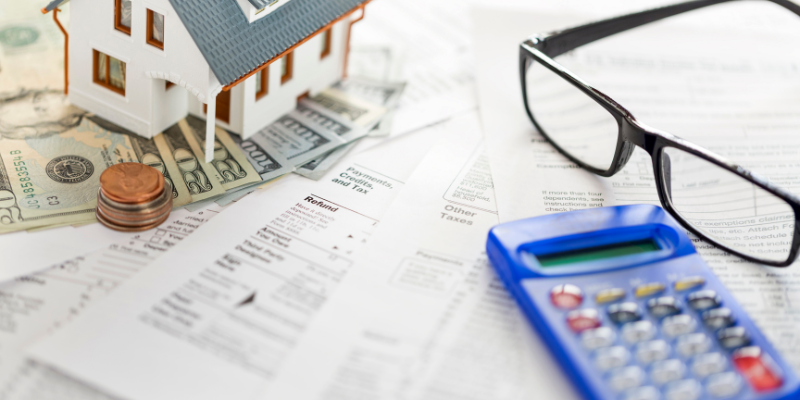
Selling a home in Garland, TX, may trigger capital gains tax on your profit. House Buying Heros can help you understand the rules and minimize your tax burden.
Understanding Capital Gains Tax in Real Estate Transactions
Understanding capital gains tax is essential for real estate transactions, especially when selling a home in Garland, TX. Capital gains tax relates to the profit made by selling a property, and it can have a considerable impact on your net earnings.
Understanding federal regulations and any related state concerns is critical for Garland homes, as it is throughout Texas. The Internal Revenue Service (IRS) offers exclusions for principal residences that can decrease or eliminate capital gains tax payments.
To be eligible for these exemptions, homeowners must meet certain requirements, such as owning and living in the property as their principal residence for at least two of the five years preceding the sale. Understanding how to determine your cost basis, including upgrades and expenses associated with buying and selling the house, can impact your taxable gain.
To accurately assess your potential capital gains liabilities, keep meticulous records of all transactions and renovations made while owning the property. Consulting with a local real estate professional or tax advisor versed in Texas rules can provide specialized counsel in Garland, assuring compliance while maximizing exemptions.
Exemptions and Deductions for Capital Gains on Property Sales
Understanding capital gains tax exemptions and deductions is vital when selling a home in Garland, TX. Homeowners can profit greatly from the principal residence deduction, which allows single filers to exclude up to $250,000 of capital gains and married couples filing jointly to exclude up to $500,000, assuming they fulfill certain ownership and use conditions.
This exemption is applicable if the home was used as a primary residence for at least two of the five years preceding the sale. Certain property upgrades may be deductible expenses, reducing taxable gains.
These may include the costs of upgrades or major repairs that increase the home’s worth. Maintaining meticulous records of these expenses is critical for maximizing deductions.
When selling property in Garland, keep in mind any Texas-specific state or local tax rules that may affect your capital gains taxes. Consulting with a tax specialist can provide individualized advice based on specific circumstances while also ensuring compliance with all applicable requirements.
Strategies to Minimize Capital Gains Tax Liability When Selling a House

If you want to sell your home for cash in Garland and nearby areas, you must know how to reduce your capital gains tax bill. One effective way to save money is by using the primary residence exclusion. This allows you to exclude up to $250,000 of capital gains if you are single, and up to $500,000 if you are married and filing jointly. To qualify, you must have lived in the home for at least two of the last five years.
Also, think about when to sell; if you do it during a year when your income is lower, you might be able to lower your overall tax bracket. Keeping detailed records of home modifications can also be helpful because you can add these costs to the initial purchase price of your house, which can lessen your taxable gain.
If you want to buy another home, you might also look into a 1031 exchange. This lets you put off paying taxes when you trade one investment property for another of the same type. A tax specialist who knows the ins and outs of Texas real estate can give you specialized advice that fits your needs and makes sure you take advantage of all possible deductions while still following IRS rules. Inherited homes follow special IRS rules—read our full guide on inherited property taxation in Garland, TX.
The Impact of Home Improvements on Capital Gains Tax Calculations
It’s important to know how home upgrades affect capital gains tax calculations when selling a house in Garland, TX. The profit you make from selling your property is subject to capital gains tax, but making renovations to your home can help lower this taxable gain.
Improvements that add value to your home, extend its lifespan, or adapt it for new uses, such as kitchen remodels, bathroom renovations, or roof replacements, can be added to the property’s cost base. Sellers might minimize their capital gains tax burden by raising the cost basis through verified home upgrades.
It’s important to keep accurate records of all the costs associated with these improvements since they may not only make the home more marketable, but they may also save you a lot of money on your taxes when you sell it. So, in Garland’s real estate market, making smart investments in your property can have a big effect on how much money you get when you sell your home by lowering the capital gains taxes you owe to the federal and state governments.
Reporting Real Estate Capital Gains on Your Federal Tax Return
In the context of selling a home in Garland, TX, it is important to understand the capital gains reporting rules on your federal tax return. Capital gains tax computation is done by determining the difference between the selling price and the original purchase price, along with any related expenses.
As a homeowner, it is also essential to understand the IRS principal residence exclusion, which permits a significant portion of the gain, $250,000 for single filers and $500,000 for married couples filing jointly, provided certain residency conditions are satisfied. The accurate bookkeeping of the property improvements will effectively raise your cost basis and thus, reduce the gain upon which you will be taxed.
Filing federal tax returns involves reporting of transactions for a year separately from other capital assets, thus, it is necessary to first report the sales on Form 8949 and then transfer the totals to Schedule D of Form 1040. Being up to date on tax related changes which may affect the capital gains reporting is crucial in strategic tax filing, compliance, and capital gains reporting.
How Capital Gains Tax Affects Home Sellers in Garland, TX

If you want to make the most money when you sell your house in Garland, TX, you need to know how capital gains tax affects you. The difference between the selling price of your house and the price you paid for it, minus any improvements and other considerations, is subject to capital gains tax.
As part of federal tax rules, people in Garland can get an exclusion of up to $250,000 if they are single or $500,000 if they are married and filing jointly when they sell their principal home, as long as they meet certain ownership and residency requirements. If their gain is within these limits, this means that many homeowners may not have to pay any capital gains tax.
But if your profit is more than these limits or if you didn’t live in the property as your main home for at least two of the five years before the sale, you might have to pay taxes on the extra gains. It’s important to keep good records of all the work you do on your home and the costs associated with buying and selling it. This is because these things can lower your taxable gain.
Also, talking to a tax expert who knows both federal and Texas laws will help you understand the rules better and make sure you get all the exemptions you can when you sell your property in Garland.
Legal Considerations and Documentation for Reducing Capital Gains Taxes
When selling a home in Garland, TX, a seller must consider the legal sides of selling a home and how to lower capital gains taxes. Several strategies are available to reduce the homeowner’s tax bill.
Taking advantage of the primary residence exclusion is very popular. It allows qualifying homeowners to exclude capital gains of up to $250,000 for single filers and $500,000 for married couples filing jointly. In order to be eligible, the homeowner must have owned the home for at least five years and lived in it as a primary residence for two out of the five years before selling.
Proper documentation is essential; keeping purchase agreements, evidence of home improvements, and past tax returns can support your claims for exclusions or deductions. Furthermore, receiving advice from a tax expert familiar with Texas real estate laws can help in knowing how to use available exemptions and credits.
Keeping organized records relieves stress in other areas as well. In this case, the records will help calculate the home’s adjusted cost basis accurately, which is essential to determine the taxable gains. Knowledge of the 1031 exchange rules from the IRS can help homeowners looking to defer paying capital gains taxes by reinvesting the proceeds into a similar property.
Legal guidance helps adhere to important federal and state rules while maximizing possible tax savings from tax real estate deals in Garland.
Common Mistakes to Avoid When Filing Taxes After a House Sale

When figuring out how to deal with capital gains tax after selling a house in Garland, TX, homeowners typically make a few basic mistakes that can cost them a lot of money. A common mistake is not knowing the primary residence exception. Many sellers don’t know that they need to have lived in the home for at least two of the five years before the sale to get this tax advantage.
Another mistake is not keeping good records of home upgrades. These costs might raise the value of your home and lower your taxable gains. Not paying attention to state-specific rules can also lead to expensive mistakes, since Texas may have special rules or perks for real estate transactions.
If you don’t fill out all the required information on IRS Form 8949 and Schedule D, you could be audited or fined. This is why it’s so important to keep accurate records. Many sellers don’t realize that changes in their marital status could affect their eligibility for exclusions. Others wrongly think that just reinvesting the money from a sale into another property will automatically defer taxes. This is only true if certain conditions are met under a 1031 exchange, which usually doesn’t apply to primary residences.
To prevent these problems and make sure you follow the rules while getting the most savings, you should talk to tax professionals who know both federal and Texas tax regulations.
When filing taxes after selling a house, avoid errors like incorrect reporting, missing exclusions, and poor record-keeping. At House Buying Heros, we buy houses for cash in Dallas and the surrounding areas for a fast, hassle-free process. We handle all the details and make the process seamless.
Do I Have to Pay Capital Gains When I Sell My House in Texas?
When dealing with the complicated capital gains tax after selling a house in Garland, TX, homeowners typically make a few basic blunders that can cost them a lot of money. Many sellers make the mistake of not knowing the main residence exception. To qualify for this tax advantage, they must have resided in the property for at least two of the five years before the sale.
Another mistake is not keeping good records of home upgrades. These costs might raise your house’s basis and lower your taxable gains. Not paying attention to state-specific rules might also cost you a lot of money, since Texas may have its own rules or benefits when it comes to real estate transactions.
If you don’t fill out all the necessary information on IRS Form 8949 and Schedule D, you could be audited or fined. This is why it’s so important to keep accurate records. Many sellers don’t realize that changes in their marital status could affect their eligibility for exclusions. Others mistakenly think that just reinvesting the money from a sale into another property will automatically defer taxes. This is not true unless certain conditions are met under a 1031 exchange, which usually doesn’t apply to primary residences.
To prevent these problems and make sure you follow the rules while getting the most savings, you should work with tax professionals who know both federal and Texas tax regulations.
How Much Is Capital Gains Tax on Property in Texas?
Homeowners in Garland, Texas, who want to get the most money for their house need to know about the capital gains tax. There is no state-specific capital gains tax on the sale of property in Texas, but there is still a federal capital gains tax.
There are a number of things that affect how much capital gains tax you owe, such as how long you’ve owned the property and how much money you make. If you’ve held the house for more than a year, any money you make from selling it is a long-term capital gain and is taxed at rates that range from 0% to 20%, depending on how much money you make.
Short-term capital gains are taxed like regular income for people who have owned their property for less than a year. This can be a higher rate. Homeowners may also be able to get exclusions. For example, married couples filing jointly can exclude up to $500,000 in gain if they fulfill certain requirements, and single filers can exclude up to $250,000.
Understanding these details can help you follow federal rules and get the best financial outcome when you sell your house in Garland, TX.
Capital gains tax on property varies by country and ownership. It applies to profits from selling non-primary residences and may have exemptions. For more help, Contact Us at House Buying Heros.
How to Calculate Capital Gains Tax on Selling a Home?
Understanding how to compute capital gains tax is critical for Garland, TX, residents selling their house. Capital gains tax is calculated by subtracting the selling price of your home from its adjusted basis, which includes the initial purchase price as well as any modifications made over time.
In Garland, TX, and elsewhere in the United States, if you have lived in your home for at least two of the five years preceding the sale, you may be eligible for a capital gains exclusion of up to $250,000 for single taxpayers or $500,000 for married couples filing jointly. To appropriately calculate capital gains tax on your Garland home sale, deduct selling fees like real estate commissions and closing costs from the sale price.
Then, deduct your adjusted basis to determine your net gain. If this sum exceeds the exclusion limit and you do not qualify for a complete exemption, it will be taxed at federal capital gains rates that vary depending on your income.
When calculating capital gains tax on your Garland home sale, contact with a tax professional who is versed with Texas real estate rules to assure compliance and maximize potential savings.
How Long Do You Have When You Sell a House to Avoid Capital Gains?
Understanding the capital gains tax ramifications of selling a house in Garland, TX, is critical for maximizing your financial results. To avoid paying capital gains tax on the sale of your house, you need to understand the IRS’s ownership and residency criteria.
In general, to qualify for the capital gains tax exclusion, you must have owned and resided in the property as your principal residence for at least two of the five years preceding the sale. This means that if you meet these requirements, you can exclude up to $250,000 of profit from capital gains tax if you’re single, or up to $500,000 if you’re married filing jointly.
It’s important to note that these provisions are specific to federal tax law and can significantly lower or even eliminate your taxable gain when selling a home. Understanding how long you’ve lived in and owned your property is key to maximizing the exclusion, meeting IRS guidelines, and minimizing tax liabilities during your real estate transaction in Garland, TX. Additionally, staying informed about the local property tax rate can help you better plan for the financial aspects of your sale.
Are you thinking about selling your home? Whether you’re facing repairs, time constraints, or just want a straightforward sale, House Buying Heros is here to help. We offer fair cash deals and manage every detail so you don’t have to. Reach out at (855) 563-4376 for a free, no-obligation offer. Start the process today, stress-free.
| TAX POLICIES | TAX SYSTEMS | TAX PAYMENTS | INVESTMENT CAPITAL | INVESTORS | PROPERTY TAX |
| PROPERTY TAXES | PROPERTY INVESTMENTS | REAL ESTATE INVESTMENTS | REAL ESTATE INVESTORS | TAX DEDUCTIONS | RENTAL PROPERTY |
| RENTAL PROPERTIES | RENTAL INCOME | WEALTH | ESCROW | CASH | TRUSTS |
| TRUST FUND | TAX-DEFERRED | TAX DEFERRAL | AVOIDING TAX | HEIRS | INHERITANCE |
| INHERITANCE TAX | ESTATE PLANNING | FEDERAL TAXES | L.L.C. | LLC | INVESTMENT ADVICE |
| FINANCIAL ADVICE | FINANCIAL ADVISORS | INVESTMENT ADVISOR | FEES | TAX EFFICIENCY | TAX ADVICE |
| BUYER | MANAGEMENT | INSURANCE | INSURANCE AGENT | FILING STATUS | CPAS |
| CERTIFIED PUBLIC ACCOUNTANTS (CPAS) | VALUATION | APPRAISAL | HOMEOWNERSHIP | MONEY | MARKET VALUE |
| INVESTMENT STRATEGY | INDIVIDUAL RETIREMENT ACCOUNTS | TRADITIONAL IRAS | IRAS | INDIVIDUAL RETIREMENT ACCOUNTS (IRAS) | INDIVIDUAL INCOME TAX |
| INCOME TAXES | PERSONAL INCOME TAX | BENEFICIARIES | REGULATORY COMPLIANCE | PORTFOLIO | INVESTMENT PORTFOLIO |
| ATTORNEY | FAIR MARKET VALUE | DEED | WYOMING | STOCKS | RETIREMENT |
| RETIREES | OPTIONS | MORTGAGE | MORTGAGE LOAN | INSTALLMENT SALE | HOMESTEAD EXEMPTION |
| INBOX | COMPANY | CAPITAL LOSSES | NET INVESTMENT INCOME TAX | SHORTTERM CAPITAL GAINS | |
| LONGTERM CAPITAL GAINS | FOR REAL ESTATE | REAL ESTATE INVESTORS | FOR LONGTERM CAPITAL | AVOID CAPITAL GAINS TAX | GAINS TAX IN TEXAS |
| HOW TO AVOID CAPITAL | LONGTERM CAPITAL GAINS RATES | LONGTERM CAPITAL GAINS ARE | LONGTERM CAPITAL GAINS TAX | FOR LONGTERM CAPITAL GAINS | 500000 FOR MARRIED COUPLES |
| TEXAS CAPITAL GAINS TAX | THE PRIMARY RESIDENCE EXEMPTION |
Helpful Garland Blog Articles
- Selling A House With Code Violations In Garland
- Capital Gains Tax On Selling A House In Garland
- Can Medical Bills Force The Sale Of Your Home In Garland
- Sell Your Garland Home Needing Repairs
- Tenant Property Damage In Garland
- Who Is Responsible For Hoa Fees At Closing In Garland, TX
- Affordable Housing Options In Garland, TX: Discover The Cheapest Places To Live
- Exploring Garland, TX: Best And Worst Neighborhoods
- Is Garland, TX A Good Place To Buy A Home?
- Successfully Sell Your Home By Owner In Garland, TX
- Optimal Season For Selling Your Home In Garland, Tx: Expert Insights On The Housing Market

